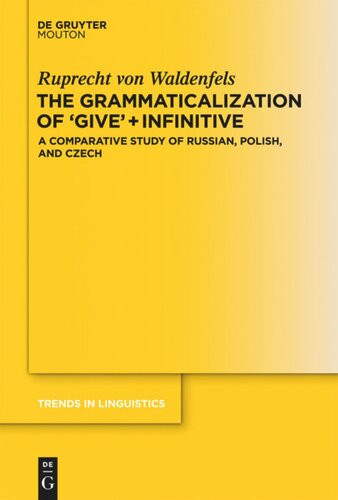

Most ebook files are in PDF format, so you can easily read them using various software such as Foxit Reader or directly on the Google Chrome browser.
Some ebook files are released by publishers in other formats such as .awz, .mobi, .epub, .fb2, etc. You may need to install specific software to read these formats on mobile/PC, such as Calibre.
Please read the tutorial at this link: https://ebookbell.com/faq
We offer FREE conversion to the popular formats you request; however, this may take some time. Therefore, right after payment, please email us, and we will try to provide the service as quickly as possible.
For some exceptional file formats or broken links (if any), please refrain from opening any disputes. Instead, email us first, and we will try to assist within a maximum of 6 hours.
EbookBell Team

4.0
6 reviewsVerbs denoting 'to give' have developed grammatical meanings in many languages of the world. The present study analyses the grammaticalization of give in causative and modal constructions in the closely related Slavic languages Russian, Polish and Czech.
Adopting a corpus driven approach, it takes departure from a detailed analysis of the use of these constructions in large reference corpora. This synchronic approach is supplemented by an analysis of the use of these constructions in Old Church Slavonic and by diachronic corpus-based accounts of the developments in Czech and Polish.
The study provides thorough descriptions of the syntax and semantics of causative constructions, ranging from permissive (letting someone do something) and reflexive permissive (letting something be done to oneself) to factitive causative (having something done by someone). It traces the development and synchronic status of modals that have developed out of reflexive permissives in Polish and Czech. General issues discussed in the study include polarity sensitivity in causatives, types of causee coding, the emergence of non-agreeing diathesis structures in Polish and the role of language contact with German.